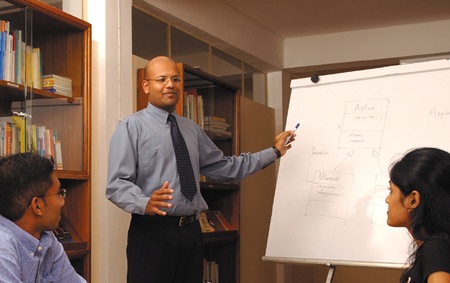
I am happy to tell you that my company, Knowledge Seven Ltd, is organising two Linux training courses in the coming weeks. Check this blog entry for more info:


I am happy to tell you that my company, Knowledge Seven Ltd, is organising two Linux training courses in the coming weeks. Check this blog entry for more info:


After all the economic and social problems we had in 2008, I believe that:
People in Mauritius, as unfortunate victims of our education system, generally tend to think on a small scale. People here generally are not very confident in their own abilities and qualities. People here often are reluctant to innovate because of ki lot la pou dire. People still have this mentalité colonialiste here where we’ll do everything to prevent a fellow Mauritian doing things while, at the same time, revering any Tom and Jack however stupid he may be provided (i) he comes from abroad and (ii) he is white.
This has to change.
We have to start to think big. It’s time to understand that we are intelligent and can change things. It’s time for each of us to have an opinion and not be afraid to voice it… however strange it may be. Could you have imagined something stranger than someone with the middle name of Hussein becoming President of the USA? No? Me neither. But this is what is happening this month. So don’t hesitate to have strange ideas. History shows that people with strange ideas change the world. We need people with strange ideas to change Mauritius.
Happy New Year 2009 to you all. And don’t forget: Think Big!

The other day while having dinner at a friend’s place, we had an interesting conversation about one of the core values of Web 2.0 i.e. harnessing collective intelligence. One friend argued that websites like Wikipedia and Amazon were so full of vandals (defacing pages on Wikipedia and writing bogus reviews on Amazon for example) that we should never use them to learn / decide what to buy…
Interestingly, my other friends said that they were not too sure about Amazon being unreliable (maybe because they had no choice than believing that the comments on Amazon were sincerely written as their entire buying strategy was based on that being true…) but, surely, he was right about Wikipedia which couldn’t possibly be authoritative.
I was the only one saying that Wikipedia is good enough. In fact, it’s more than good enough in the sense that if one feels a specific page is not good enough he can make it become good enough by editing it. Of course, there are vandals on Wikipedia but the website features an excellent version tracking system and, more important, more honest people than vandals.
In fact, I immediately realised that some people had a bad perception of Wikipedia because, brace yourself, it is free. Yep. Same as open source software. For some bizarre reason, some of us believe that something which is free is obligatorily not good. And, of course, what is expensive is obligatorily good.
And this is a very bad thing. Because it’s false. Remember this when doing your Christmas shopping.
Merry Christmas to you!
